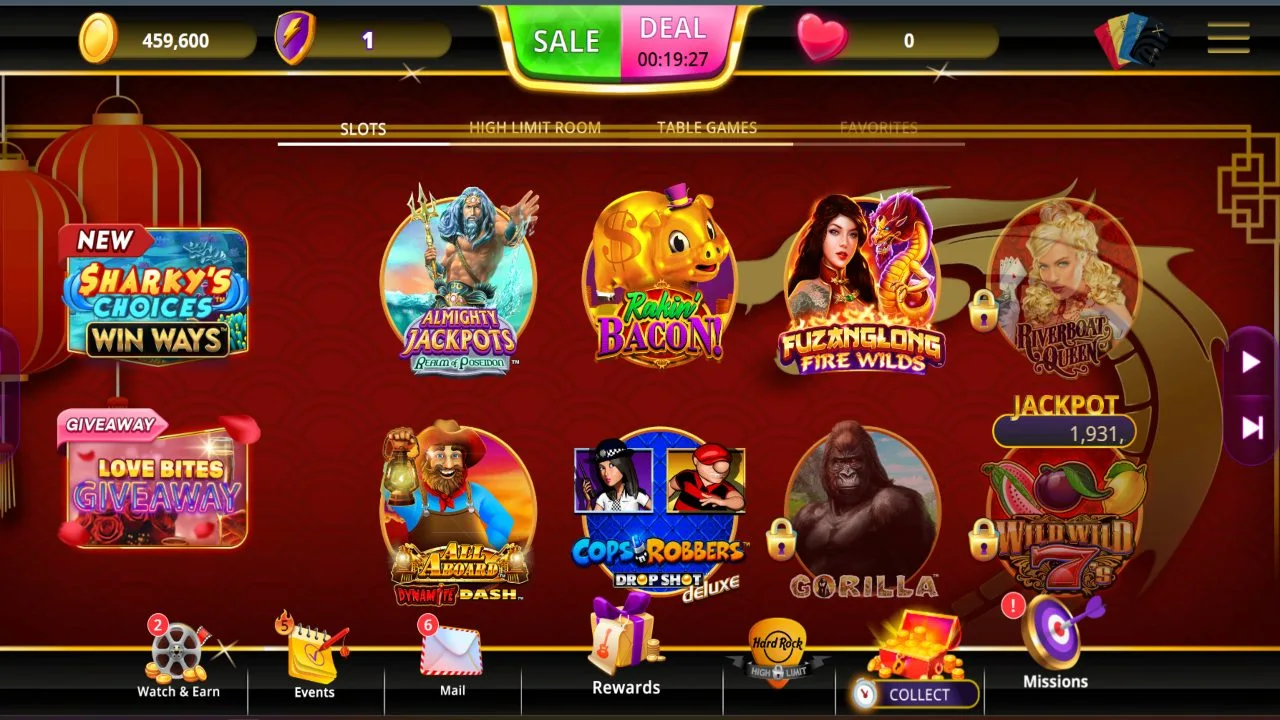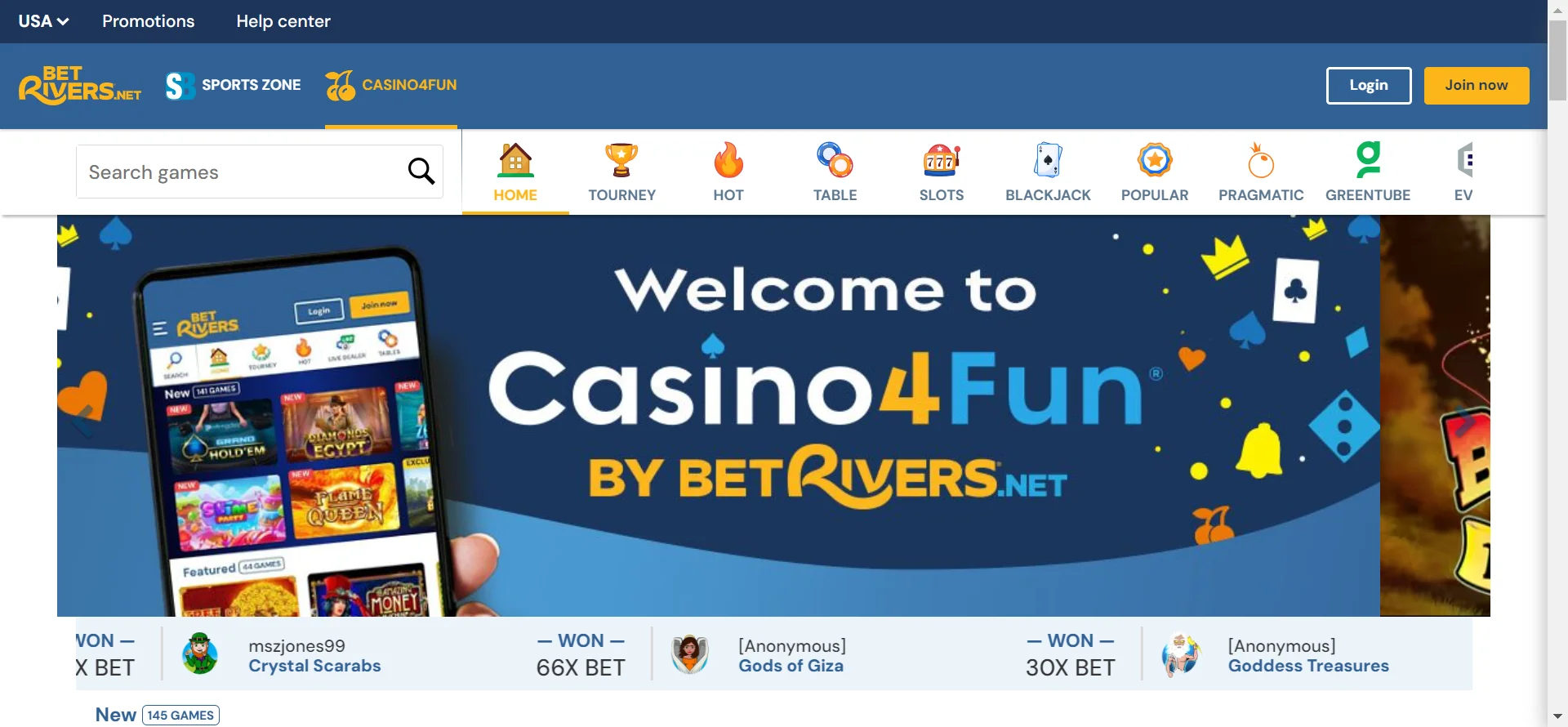Most sites calling themselves social casinos fall into two categories. One lets you redeem coins for prizes. The other doesn’t – and you often don’t realize which one you’re on until after you’ve spent money.


By Nemanja M.
Welcome bonus
550K GC + 55 SC
This page is all about true social casinos – the kind that run on one currency, don’t offer real-money redemptions, and stick to entertainment-only gameplay. That’s the second toplist above – and that’s where we’re staying for now.
Why? Because that distinction matters. Whether an operator lets you cash out or not changes everything: the rules it follows, the states it can operate in, and what you’re actually signing up for.
We’ll dig into the details later on.
👀 Want the prize-based version instead?
Let’s break down the six platforms from our second toplist – all built around single-currency, non-redeemable gameplay.
We’ll line them up side by side so you can see how they differ in game variety, age limits, state restrictions, and how their core experience actually plays out.
| Site | Min. Age | Redeemable? | Amount of Games | State Restrictions | In-Game Currency Used |
| Gambino Slots | 18+ | ❌ No | 150+ | ❌ | Coins, Spins (non-redeemable) |
| Hard Rock Social | 21+ | ❌ No | 170+ | ❌ | Chips (free & paid, no cash-out) |
| BetRivers.net | 21+ | ❌ No | 600+ | ❌ | Free Coins / Points (progression only) |
| Slotomania | 21+ | ❌ No | 170+ | ❌ | Coins, SlotoCards, Bonuses |
| DoubleDown | 18+ | ❌ No | 200+ | ❌ | Chips (purchased or won, no value) |
| Huuuge Casino | 18+ | ❌ No | 200+ | ✅ Washington, Idaho | Chips (buy/play only, not real money) |
You’ve seen our six picks. Now we’re zooming in on the three social casinos of our list that stood out the most – the ones that made social gameplay feel polished, consistent, and worth coming back to. Let’s take a closer look.
Our Sweepcasinos Rating:


Pros
Cons




500,000 G-Coins + 200 Free Spins
500,000 GC + 200 free spins
18+ | New Players Only | T&C Apply | T&C apply
Summary
You don’t need to dig around – Gambino Slots gives you 500,000 coins and 200 spins the moment you sign up. That’s before you play anything. No delays, no bonus menus to navigate. You’re just in, and it starts moving.
Everything on this social casino platform revolves around sweepstakes slots. That’s the whole experience – over 150 of them. Some look stripped-down, others go full spectacle with animated reels and layered sound – but none of them feel like copies. I jumped from machine to machine for about an hour before settling into a few that hit right.
Our Sweepcasinos Rating:


Pros
Cons
Summary
The notorious Hard Rock Social Casino opens with clarity: chips only. No prize redemptions. No second-currency tricks. As soon as you log in, you know exactly what game you’re in.
Then the experience shows itself. I earned a welcome-chip bundle right away. And when I returned the next day, the bonus wheel felt a notch stronger- a reward structure that values consistency over one-time purchases.
Our Sweepcasinos Rating:


Pros
Cons
Summary
BetRivers.net had one big question in store for me: can a site that doesn’t pay out real prizes still feel like a real casino? Somehow, it pulls that off better than most.
You walk in and it actually feels like a full setup – not just reels. You’ve got blackjack, video poker, roulette, even a full sportsbook sim. You don’t get two currencies to juggle. No gold coins, no sweeps coins. Just play chips. Win more, lose more, repeat.
We’ve walked through our recommended list of social casinos – the kind that don’t offer redemptions and stay entirely in-game.
Now it’s time to look at why that difference matters.
The next section unpacks what sets these platforms apart from prize-based models – and why, in 2026, that line isn’t just technical. It’s the one regulators are watching most closely.
Definition: Social Casino
Noun phrase
A social casino is an online platform where you play games like slots, blackjack, or roulette using virtual coins – without any cashing out. You’re not in it for a payout. You’re playing to keep momentum, unlock features, or stay on a streak. Coins can come from logins, rewards, or purchases – but whatever you win stays part of the play cycle, not your wallet. It’s built for entertainment, not earnings.
See also;
Sweepstakes CasinoIf you’re in it for the games, the rhythm, and a focused setup, social casinos in the US get the job done. You play with a single currency, and everything stays inside the experience.
But if you’re hoping to turn play into something tangible – a prize, a payout, a gift card – this model doesn’t lead there.
Here’s the real picture: what these sites do well, where they fall short, and what that means before you jump in.
| What works | What doesn’t |
| ✅ Legal almost everywhere; no cash prizes means no gambling license needed | ❌ No payouts; nothing you win turns into money or rewards |
| ✅ 1 currency – play, buy, repeat; no dual balances to track | ❌ When coins run out, you either wait or pay to keep going |
| ✅ No confusing prize systems; just the game itself | ❌ If you’re expecting real winnings, you’ll be disappointed |
| ✅ Easier to build and update; which means faster launches, fresher content | ❌ Still costs money if you play often; and there’s no return on that spend |
| ✅ Clear value exchange; you’re buying access, not chasing a jackpot | ❌ Some players misread the model and feel misled when nothing cashes out |
Social and sweepstakes casinos are both legal in most states because they’re designed to avoid being classified as gambling.
But they get there in different ways: one removes the prize, the other keeps the prize but avoids making payment a requirement.
That difference affects what you’re allowed to win, whether the site can operate in your state, and how closely regulators are watching.
Before we break down how each model works, we need to start with the baseline: what actually counts as gambling under U.S. law. Without that, it’s impossible to understand how either model stays compliant – or where the risk lines really are.
A site is considered gambling if it includes all three of these elements:
| Legal Element | Meaning |
| Consideration | You pay or risk something of value to play |
| Chance | The outcome is random—not skill-based |
| Prize | You can win something with real-world value |
Why that matters:
If a platform includes all three, it’s legally gambling. That means it must be licensed, regulated, and geo-restricted to states that allow online gambling (like New Jersey, Michigan, Pennsylvania, etc.).
If a site offers all three elements without a license, it’s likely breaking state law.
Social casinos remove two of the three elements that define gambling. You might choose to buy coins to extend your play, but you’re never required to – and you can’t redeem anything you win. Everything stays inside the game.
| Element | Included? |
| Consideration | ❌ Not required (coins can be earned for free) |
| Chance | ✅ Yes |
| Prize | ❌ No |
Why that matters:
With no required payment and no prize, social casinos stay well outside gambling law. You can choose to spend money – usually to buy more coins, speed up gameplay, or unlock extra features – but nothing you win can be turned into cash, gift cards, or anything of value outside the game.
You’re playing for entertainment only, and every dollar you spend stays inside that system.
📌 That’s why this model is legal in nearly all U.S. states – including those that have banned real-money gambling or blocked prize-based alternatives.
Sweepstakes casinos, like the ones in our first toplist, do not require a payment from your end.
You can still win real prizes – but the site offers ways to enter and play without buying anything, usually through login rewards or mail-in requests.
| Element | Included? |
| Consideration | ❌ Not required* |
| Chance | ✅ Yes |
| Prize | ✅ Yes |
*You can pay – but the site must offer a no-purchase-necessary entry method (AMOE) to stay compliant with U.S. laws.
Why that matters:
Because you don’t have to pay to enter, these platforms fall under sweepstakes law – not gambling law. That’s how they can offer cash prizes in most states without needing a gambling license.
📌 Still, this model faces more legal friction. Some states (like NY, MI, WA) treat these platforms as too close to unregulated gambling and have blocked or restricted them.
At this point, you know the legal models. You know which platforms fall under “true social” – and which ones operate on the sweepstakes system.
So let’s step back and look at the full picture – where do social casinos and sweepstakes sites actually differ, and where do they overlap?
| Category | Social Casinos | Sweepstakes |
| Currency Type | Single coin system (non-redeemable) | Two-coin system: GC (non-cash), SC (can be redeemed) |
| Payouts | Nothing leaves the game – coins and wins stay inside | SC balances can be turned into cash or gift cards |
| Entry Cost | Free to start; optional purchases for in-game extras | Free to enter via AMOE; purchases often include bonus SC |
| Legal Compliance | Avoids gambling rules by removing the prize entirely | Compliant via sweepstakes exceptions (no purchase necessary clause) |
| Redemption Setup | Not available | Yes – with specific redemption flow |
| Minimum Age | Usually 18+, sometimes 21+ | Typically 18+ or 21+, depending on local laws |
| Game Types | Focused on slots, some include blackjack, roulette, video poker | Similar mix, but often with jackpot or prize-forward spins |
| State Access | Allowed in almost every state | Blocked in several, including NY, WA, MI, ID |
| Why People Pay | For faster access, bigger coin packs, or smoother progression | For a shot at redeemable SC wins |
Until now, most players haven’t worried about whether a site calls itself “social” or “sweepstakes.”
The terms are used interchangeably – even by the platforms themselves. If it looked free to play, that seemed safe enough.
However, this assumption is flawed and should no longer be made.
In 2025, New York led a shift that’s now shaping how other states respond.
Under Penal Law §156.40 and Racing Law §912, any platform that offers prize-based play using chance-based mechanics – this regardless of how coins are earned – is treated as illegal gambling.
Here the important part: that includes sweepstakes casinos, even those offering “free” coins through login bonuses or mail-in options.
And here also the problem: many of these sites still use “social casino” as a marketing label, even if they offer cashable prizes. That mislabeling creates confusion – and in places like New York, that confusion can come with consequences.
In states like New York, it’s not just the operators who face consequences.
Under §156.40, players themselves can be penalized – not just for running a platform, but for accessing one that’s banned.
▶️ If you knowingly log in from a restricted state
▶️ If you use a VPN to get around geolocation
▶️ If you play on a prize-based site that calls itself “social”
…you’re no longer just a user. You can be treated as part of the gambling operation. That includes felony-level charges, depending on how the law is interpreted.
Right now, platforms still mix the terms “social” and “sweepstakes” – in marketing, in help pages, even in legal disclaimers.
That confusion is already risky for users. But here’s the bigger issue:
🛑 If the terminology doesn’t change, enforcement will.
The longer “social” keeps being used as a cover term for prize-based mechanics, the higher the chances that players get caught in the crossfire.
If nothing comes back out, why do people still spend?
That’s the real question. Social online casinos don’t hand out prizes, don’t issue payouts, and don’t dangle redemptions. You play inside a closed loop. So what’s the reason for buying in?
It turns out, there’s one – and it’s got nothing to do with prizes.
You’re not placing a bet. You’re adjusting the tempo.
On most social platforms, purchases don’t change your odds. They just prevent stoppage. Coins extend a session, unlock machines earlier, or keep a streak intact. The value isn’t external – it’s entirely inside the rhythm of the game.
This logic isn’t abstract – you see it clearly on the better-built platforms.
Let us look at some examples:
Each scenario is about continuity. Not prizes, not redemptions – just maintaining forward motion.
The only risk here comes from confusion – not the platform itself.
If you expect a win-back system, you’ll walk away frustrated. Worse, in some states, you might end up breaching local law just by misinterpreting what the site is.
But none of these platforms suggest otherwise. They run on one coin type. Nothing cashes out. And you can always wait it out instead of spending.
And that’s the full picture.
Social casinos aren’t new – but the pace in 2026 feels different.
At SweepCasinos, we’ve seen the shift up close. This isn’t a trend built on hype. We see it more as a structural thing.
Here’s what we think is driving the next wave of new social casinos in the USA :
If you want to launch nationwide in the U.S., there’s no simpler model than a non-redeemable social casino. No AMOE logistics, no state-by-state payout reviews, and no need to walk the fine line of sweepstakes law.
You strip out the prize, and the game becomes just that – a game. That legal clarity is saving operators time, compliance overhead, and potential takedown orders.
Sweepstakes casinos are legally possible. But scaling them? That’s a different story. The more states you reach, the more local rules you have to elegantly dance around.
Social online casinos don’t hit that wall. If you’re not offering a prize, you don’t need to geo-fence. You don’t need backup AMOE plans. And you don’t need to worry about which attorney general wakes up cranky next quarter.
Let’s be blunt: most sweepstakes casinos don’t pay out much. Operators know that. Players eventually figure it out too.
But in social online casinos, you’re not promising anything. You’re selling coins, boosters, streak extensions – and users know exactly what they’re paying for. It’s direct. It’s transparent. And platforms keep more control over value pacing and offer structures.
Studios that come from mobile games know how to monetize through gameplay alone. They’ve done it with match-threes, tower defense, and RPGs.
So when they build slot-style games, they’re not wired to deal with legal coin-to-cash logic. The best social casino – without prizes, without redemptions – fits right into their stack. And they don’t need gambling consultants to ship version one.
States like New York, Michigan, Idaho, and Washington aren’t backing off. They’re writing new laws and expanding definitions to include sweepstakes mechanics.
But online social casinos? Well, they avoid all of that – and not accidentally. They’re built to fly under the radar because there’s nothing to regulate. That’s becoming a strategic decision for operators who want to grow without needing lawyers in three time zones.
You don’t need a prize to make a spin feel worth it.
What holds attention now isn’t a payout screen – it’s rhythm. Balance that stretches. Games that hold shape. A loop that doesn’t push or pander. That’s what the new wave of social casinos is tapping into.
And that’s what we’ll keep tracking. Not who shouts loudest – but who builds play that holds up. No wrappers, no redemptions, no split currencies. Just clean momentum and clear lines.
We’re watching. And when a platform earns its place, it lands here.
Social casinos are digital platforms — websites or apps — where you play casino-style games using virtual coins instead of your real money. You can often earn those coins for free through logins or gameplay. Some users choose to buy extra coins, but nothing is ever cashed out. Legally, they don’t qualify as gambling because there’s no prize involved — just play, spend, repeat.
You start with a balance of free virtual coins – either given at sign-up or added through daily logins. You use those coins to play games like slots or blackjack. Some players pay to top up, but you never withdraw anything. There’s no cash prize, no redemption. Everything stays on the site.
They sell coins that don’t lead to prizes. You’re paying to keep playing, not to win anything back. It’s closer to buying game time or cosmetic upgrades – not wagering. That structure lets them operate legally in almost every U.S. state.
It depends on how strictly you define “social.” If you count only the platforms with one in-game currency and no prize options, you’re looking at a few dozen major ones – fewer than sweepstakes casinos, but growing fast as legal pressure rises.
Social casinos offer games that look and feel like slots or blackjack, but nothing you win can be turned into money, gift cards, or rewards. You can play, and even spend, but it all stays within the game.
Sweepstakes casinos layer in a second coin – one that can be redeemed. Even if you don’t pay to play, the fact that your wins can become something of value puts them in a different legal category.